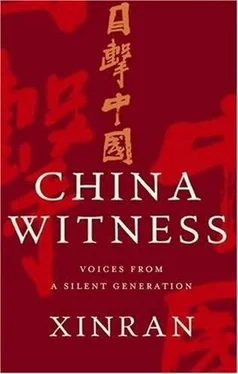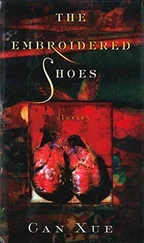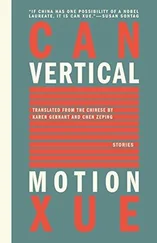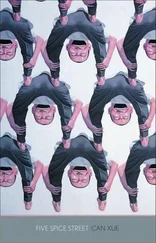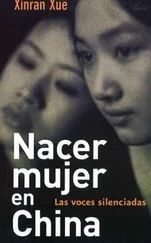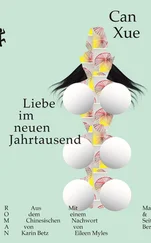"They are," Yao Popo (Chinese for Medicine Woman) replied in a Hunan accent, without even looking up from the bunch of herbs she was binding.
"What about these? Where are these from?" I asked again, trying to get her to open up.
She finally looked up at me. "I don't pick them myself. Local farmers bring me my stock."
I climbed one of the two low steps in front of her shop. "You must be famous round here, then."
"I'm just an ordinary old woman," she smiled. "I've been here a long time, that's all."
"So when did you start selling medicine?"
"Oh, years ago. Was there anything particular you were looking for?" Yao Popo eyed Toby, standing a little way back from the shop. A foreigner would be a rare sight in provincial Xingyi. "Who's that?"
"My husband," I quickly explained.
The Medicine Woman squinted. "He's tall. And handsome. My daughter married a foreigner too, a Taiwanese." A lot of people in rural China think that anyone from outside the mainland counts as a foreigner – even if they are ethnic Chinese. "He treats her well, but he's not much to look at."
It was my turn to smile. "Are a man's looks so very important?"
"Of course!" she frowned. "Or you'll have ugly children."
I smiled because I knew how to get her to talk to me now. "How many children do you have?"
She was delighted to be asked. "Two sons and five daughters, a dozen grandchildren and four great-grandchildren!"
Yet again, I was reminded of how much importance Chinese women attach to having children. "Goodness me. Lucky you."
"How about you?" Yao Popo asked me, suddenly looking worried on my behalf.
I felt touched by her concern. "Just the one son. He's eighteen."
"Only one?" Yao Popo was unable to conceal her sense of regret. "At least you had a boy, I suppose. Back then, when I was young, we were told to have lots. If you didn't, everyone said you were a bad woman."
In the 1950s, ignoring the warnings of demographers and economists, Mao Zedong encouraged women to have as many children as they could, telling them it was a heroic thing to do. He thought that its enormous population would turn China into a global superpower.
I next asked a question to which I already knew the answer. "You're a woman – do you really think sons are better than daughters?"
She stared uncomprehendingly at me. "It's because we're women that we need to have sons, to protect us. Before 1949, women who didn't manage to have sons really suffered. Girls were always abandoned before boys. I almost starved to death myself. I wouldn't be here today, if my father hadn't taken pity on me."
I climbed the second step. "I'd like to hear about your life."
She batted a hand at me dismissively. "What's there to hear? No one takes notice of what us old people have to say, not even my children. What good would it do you if I told you? Don't waste your time, or your husband's. Off you go, he's waiting for you."
Glancing around to check there were no other customers about, I sat down on a small stool next to her. "I'm not going until you've told me about yourself!"
She looked at me, surprised. "Do you really mean it?" she said, more seriously.
I nodded. "I want to be able to tell my son about people like you. He moved to England six years ago, when he was only twelve. He has no idea about ordinary Chinese people's lives. Whenever I come back to China, I ask people I meet whether they know about their mothers' lives. Most of them don't know their mothers' or their grandmothers' stories. I want to write them down, for later generations to read. I don't want everything your generation suffered to be forgotten. If our children don't know how their grandparents suffered, they won't know how lucky they are. Tell me why you seem so different from everyone else on this street, why you look so happy and calm."
She shook her head. "I've suffered much more than anyone else round here."
She told me she had been born seventy-nine years ago in Hunan. As her mother had died when she was four and the family was very poor, her father gave her and five of her brothers and sisters away to other people. She went to a travelling medicinal herb seller, to whom she was later apprenticed, and who also had a foster son, five years older than her, who could play the huqin, a kind of two-stringed Chinese violin. Because she was quick-witted, a fast learner, her adopted family took a liking to her. At the time, itinerant physicians used music and acrobatics to attract custom to their roadside stalls, and she quickly mastered various gymnastic tricks for the purpose – such as handstands, headstands, spinning jars on the soles of her feet. At the same time, the medicine man began passing on to his children some of his knowledge about herbal prescriptions. At the start of the 1940s, with the country torn apart by war, he decided to move the family over the mountains from Hunan to Yunnan, to escape the fighting. As they were too poor to travel by train, they walked and begged lifts wherever they could, on carts, railway repair wagons, and so on. Worried that, as an unmarried girl, his adopted daughter might be abused by passing soldiers, the father quickly married off his two children. After wandering about the mountains of Guizhou for a few years from 1946, in 1950 they arrived in Xingyi, which at that time had just been liberated by the Communists. The municipal government persuaded them to settle there, and helped them to open a Chinese medicine clinic for the local population, which had almost no access to medical treatment. Barely twenty years old at the time, the Medicine Woman looked after her growing family and sold prescriptions from home, while her father went out on domiciliary visits and her husband ran the clinic.
"Life was hard in those years," Yao Popo remembered, "with seven young children. Every day I worried about what we'd eat the next. Luckily, everyone listened to what Chairman Mao said, about it being good to have lots of children, and the government and the neighbours helped out when things got difficult. It's not like now, when no one trusts anyone else, no one helps anyone. Back then, officials never took advantage of you. Or ever forced us to pass any medical certificate." At the same time, she was gaining a reputation for her medical skills; some people even thought her prescriptions better than her husband's.
"You probably don't believe me, but I can tell what's wrong with a person from the look in his eyes, or the colour of his face – even from the smell of his farts or burps. I'm best at curing headaches, stomach aches and joint aches."
The idea was extraordinary: that she could see straight into you, like an X-ray machine. The fierce certainty on her face made me believe her though.
I very much wanted to know why she thought life back then was so different from China today. "What happened afterwards?" I asked instead.
"When? The sixties and seventies? I made a lot of money!" Yao Popo's eyes glinted mischievously.
"You made money during the Cultural Revolution?" I thought I must have misheard. For so long, I had heard nothing but anger, grief and loss in recollections of this period. I had encountered so many victims that I sometimes wondered where all the perpetrators of this misery – the millions of violent, even murderous Red Guards – could have disappeared off to.
Seeing my incomprehension, she smiled. "I'm telling the truth: I really did! With everyone arguing and fighting and making revolution, the hospitals and medical schools had all shut down. But the revolution wasn't curing their sickness; it was making it worse. So more and more people came to me for medicine. I was revolutionary too; I helped a lot of people who couldn't afford medicine, for free. I made my money from the rebels, from the Red Guards. Because if they'd just taken my medicine, if they'd not paid me for it, they would have been no better than capitalists. Though I didn't actually want too much of their money. I was worried that if they became poor, they'd make even more revolution. Yes, I made a lot of money in the Cultural Revolution, but I also saw terrible things: people forced to confess things they hadn't done, punished for crimes they hadn't committed; everyone was terrified the whole time. The money didn't make me happy."
Читать дальше
